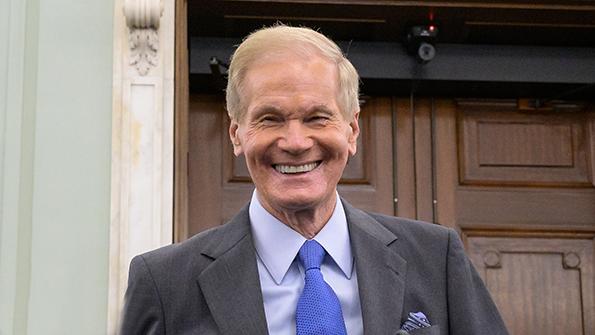
The former U.S. senator from Florida, sworn in as NASA administrator on May 3 by Vice President Kamala Harris, is starting his term with a warning to China about control of rockets it lofts into orbit. One of his first interviews in office was with Aviation Week’s Irene Klotz. Excerpts follow.
Why did you decide that your many years in public service weren’t enough and you wanted to become the NASA administrator? I am by nature a public servant. It has been 44 years of public service, 42 of which were elected public service. And of course, the space program is in my blood.
When I got the call from the transition [team], they said [President Joe Biden] wants you to do this, and I said, “Well, let me think about it.” I had recommended three women to be the administrator. I said, “I will do it, if you will appoint from someone like among the three women that I had recommended as deputy administrator.” All of them were very technically proficient, and they chose Pam [Melroy]. Pam is going to be a partner.
One of the things that’s changed over the years has been your vote on programs like Commercial Cargo and Commercial Crew compared with funding for the Space Launch System (SLS) rocket and Orion crew capsule. Do you still feel committed as strongly to SLS and Orion, even though commercial industry is charting new paths, and how will you determine when the commercial sector is ready for deep-space exploration or transportation? I feel very strongly about the commercial program and the SLS and Orion approach. What you just stated is an incorrect rap. When I was nominated, detractors went out and said, “Oh, Nelson has been against commercial.” That’s just not borne out by history. When I was a young congressman in the 1980s and the chairman of the space subcommittee, I passed the first commercial space bill. Fast-forward into the Senate, and [former Texas Sen.] Kay Bailey Hutchison and I passed the first commercial bill that seriously moved NASA in that direction in 2005. And then in 2010, at the beginning of the Obama administration when things were in flux, we were able to get Jack Lew, the chief of staff, to come together, and Kay and I fashioned the 2010 NASA bill that set NASA on course. It is a dual course. One track was commercial and, at the time, we were anticipating the low Earth orbit (LEO) of crew and cargo. The other track was to get out of LEO and go explore.
I think that is what has now borne fruit, that dual track. It was expanded in the Trump administration to have the actual [lunar] landing being done by a commercial operation.
We don’t have a Starship flying. But we’re going to have an SLS flying at the end of the year or the beginning of next year. And so, put this in the context of 11 years ago, when you put together the direction that you’re trying to give NASA. You want to keep it going.
Do you see an opportunity to bring China into the family of international civil space partnerships? There is a statute that limits the degree to which actual activities can occur between the U.S. and China. There are obvious things that you would want to cooperate on, such as collaboration, so you don’t run into their piece of space junk—which was coming within 180 mi. of the space station. We knew that because of the Defense Department, not because the Chinese told us. This activity with this rocket piece is something that we should not have in the future. There ought to be transparency. There ought to be cooperation and communication.
Several private astronaut missions are getting ready to launch. Do you feel it is safe for private people to be flying in space? I asked [Associate Administrator] Bob Cabana about this very same thing. I wanted his opinion. And he said, “If they have the proper training, it is safe.” I said, “Do they do what you and I went through?” We’re going to look into that. I think that constantly has to be monitored to make sure that it is safe, and that the people who are flying not only are medically fit but mentally fit as well. . . . Obviously it has got to be safe, but we want to open this up to the commercial world.
What do you feel is the most important lesson that you’ve learned as an overseer of NASA that you intend to practice? NASA is like the Defense Department. It should be bipartisan. Indeed, it should be nonpartisan. And I think the kind of reception I received in the Senate is indicative that they know I genuinely mean that, because that’s what I’ve preached. I’ve had chairmanships and been the ranking member of committees dealing with space in the House and the Senate, and where NASA has not been bipartisan in its approach it has gotten in trouble.


Comments